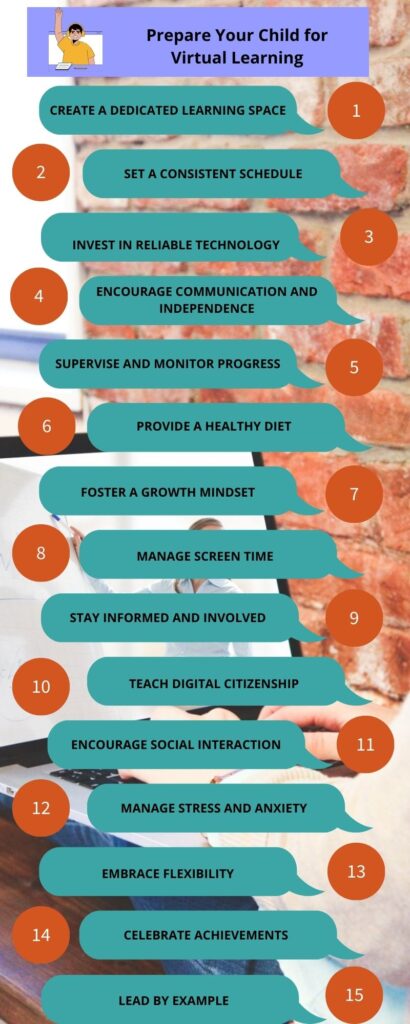Virtual learning has become increasingly important in education over recent years. Many students today rely on virtual learning to help them succeed. The COVID-19 pandemic has made virtual learning even more necessary, as schools and parents have had to adapt to remote learning quickly. Parents can help their children prepare for virtual learning success by playing an active role. This article will explore effective strategies to help you equip your child for the challenges and opportunities of virtual education.

Create a Dedicated Learning Space
One of the first steps in preparing your child for virtual learning is to establish a dedicated learning space. This space should be comfortable, free from distractions, and equipped with the necessary tools for online learning. Ensure that your child has a suitable desk or table and a comfortable chair. Having a specific location for learning helps establish a routine and signals to your child that it’s time to focus.
Set a Consistent Schedule
Consistency is key when it comes to virtual learning. Establish a daily schedule that mirrors a typical school day, complete with set wake-up times, breaks, lunch, and study periods. By maintaining a routine, you help your child build structure and discipline, which are vital for effective virtual learning. This schedule should also include regular physical activity and outdoor time to keep your child’s mind and body active and healthy.
Invest in Reliable Technology
Virtual learning heavily relies on technology, so it’s crucial to invest in reliable devices and a stable internet connection. Make sure your child has access to a computer or tablet, a headset with a microphone, and a stable internet connection. Regularly update and maintain these tools to ensure they function optimally. Additionally, be prepared for technical issues that may arise and have a plan in place for troubleshooting or seeking technical support.
Encourage Communication and Independence
Virtual learning often requires students to take more initiative in their education. Encourage your child to ask questions and communicate with teachers and peers through email or virtual platforms. Foster their independence by allowing them to manage their assignments, calendars, and online resources. It will help them develop essential skills for self-directed learning.
Supervise and Monitor Progress
While promoting independence is crucial, it’s equally important to provide guidance and supervision. Regularly check in on your child’s progress, review their assignments, and ensure they are staying on track. It helps prevent procrastination and ensures your child is understanding the material. Offer assistance when needed, and make sure your child feels comfortable asking for help when they encounter challenges.
Provide a Healthy Diet
A well-balanced diet plays a significant role in your child’s ability to focus and learn. Ensure they have access to nutritious meals and snacks. A diet rich in fruits, vegetables, whole grains, and lean proteins can enhance cognitive function and energy levels. Avoid excessive sugar and processed foods, as they can lead to energy crashes and decreased concentration.
Foster a Growth Mindset
Teach your child about the concept of a growth mindset, which encourages resilience and a positive attitude toward learning. Emphasize that it’s okay to make mistakes and that learning from them is part of the process. Praise effort and persistence rather than innate ability, as this fosters a love of learning and the determination to overcome challenges.
Manage Screen Time
With virtual learning, it’s easy for students to spend an excessive amount of time in front of screens. It’s essential to set limits on recreational screen time to prevent eye strain and promote a healthy balance between academics and leisure. Encourage your child to engage in offline activities such as reading, playing games, or pursuing hobbies.
Stay Informed and Involved
Keep yourself informed about your child’s virtual learning environment, including their school’s policies, curriculum, and communication channels. Attend parent-teacher meetings and stay involved in your child’s education. It ensures you can address any concerns or issues promptly and offer support when needed.
Teach Digital Citizenship
In a virtual learning environment, digital citizenship is as important as real-world citizenship. Teach your child about online etiquette, internet safety, and the responsible use of digital resources. Emphasize the importance of respectful communication and the consequences of cyberbullying. Help your child understand the potential risks and benefits of the internet.
Encourage Social Interaction
One of the challenges of virtual learning is the potential for social isolation. Encourage your child to maintain social connections with peers through virtual hangouts, online clubs, or group projects. Building and maintaining friendships is an essential part of a child’s development and can help combat feelings of loneliness.
Manage Stress and Anxiety
Virtual learning can be stressful for students, especially if they struggle with self-motivation or encounter technical difficulties. Be attuned to signs of stress or anxiety in your child and offer support. Teach stress management techniques such as deep breathing exercises or mindfulness to help them stay calm and focused.
Embrace Flexibility
Flexibility is key to the success of virtual learning. Understand that not every day will go perfectly, and it’s okay to make adjustments to the schedule or approach when needed. Be adaptable and open to changes, and encourage your child to do the same.
Celebrate Achievements
Acknowledge and celebrate your child’s accomplishments, no matter how small they may seem. Completing assignments, mastering a difficult concept, or staying focused during a challenging virtual class are all reasons to celebrate. Positive reinforcement can boost your child’s confidence and motivation.
Lead By Example
Lastly, be a positive role model for your child. Demonstrate a strong work ethic, a love of learning, and a growth mindset. Your attitude towards education and your commitment to your responsibilities will influence your child’s approach to virtual learning.
Related: Creating Unforgettable Moments: Tips to Plan a Kid’s Birthday Party
Final Words
To prepare your child for virtual learning, you should create a comfortable environment, establish a routine, encourage independence, and be there for support when needed. With the right approach, your child can excel in virtual learning and develop both academic knowledge and digital skills. By actively participating in your child’s education and promoting a positive attitude towards learning, you can help them succeed in virtual learning.




